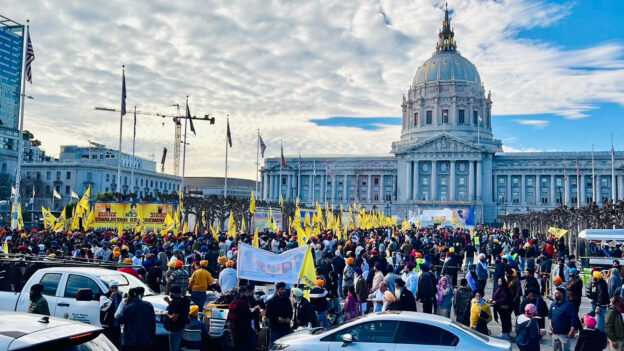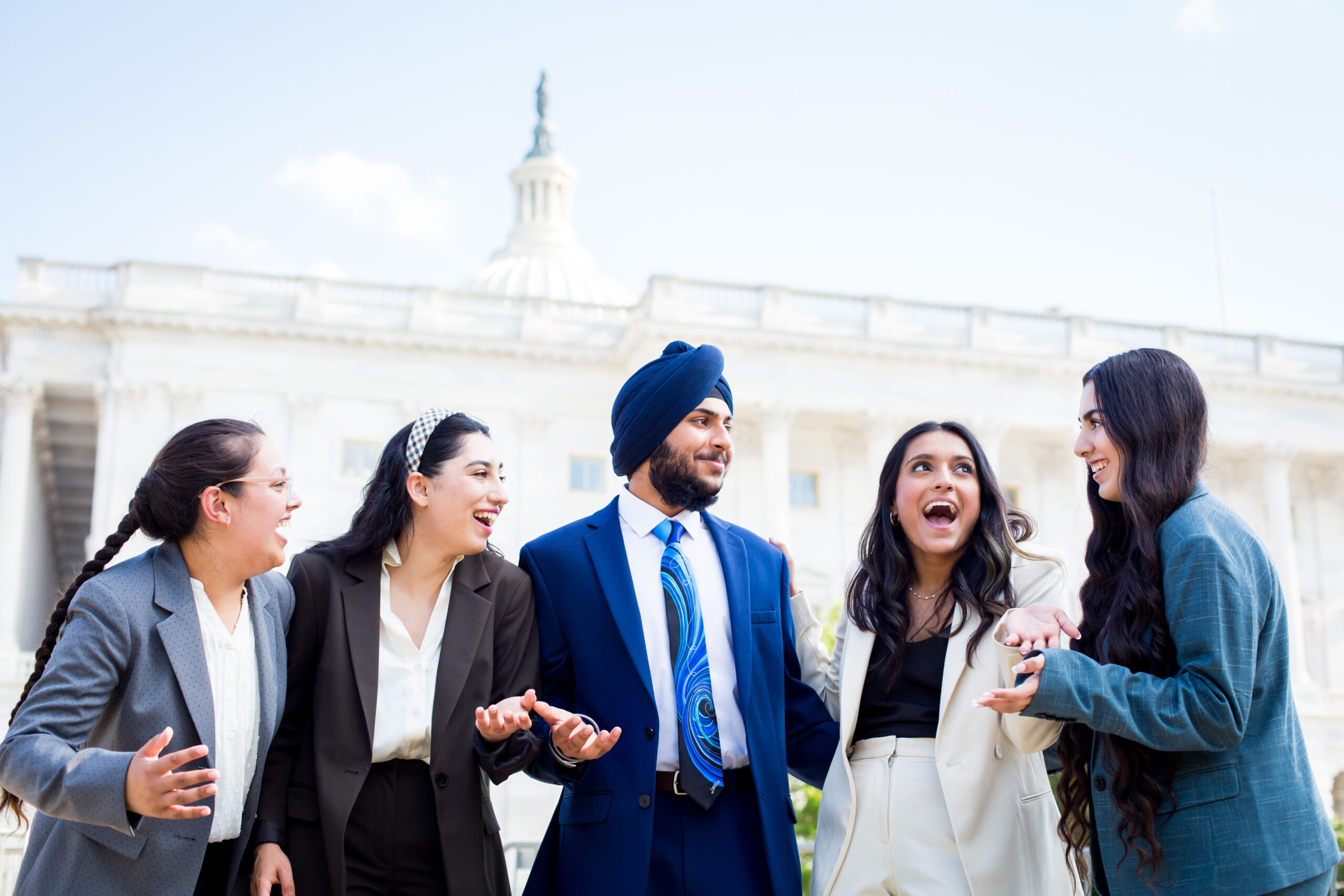Sikh Americans, citing ‘Transnational Repression,’ vote for an independent homeland
Read the Full Article from Religion News
(RNS) — More and more Sikh Americans are fearful about an ‘alarming rise’ in transnational repression, according to several Sikh advocacy organizations.

Last Sunday (Jan. 28), more than 120,000 Sikhs of all ages and occupations took part in a historic referendum in San Francisco on the creation of an autonomous homeland in northwestern India. They braved hourslong lines after already long commutes, in many cases from neighboring states, to reach the polling place in the City by the Bay.
These Sikhs, almost all of them U.S. citizens and residents, were voting aspirationally for the creation of Khalistan — a hoped-for but nonexistent “land of the pure” that would stand separate from the nation of India.
Organized by Sikhs for Justice, an activist group that is banned in India, the vote was aimed at raising the profile of Sikh efforts to convince the government of India to allow Punjab, the state where the Sikhi faith was born, to secede.
Though only symbolic, the vote for self-determination, said Harjeet Singh, a Seattle resident who voted in the referendum, was taken to “shake up and wake up” the Indian government to take accountability for their “historical oppression” and hold a binding referendum in Punjab.
“There are people who are proposing a solution to a problem. Now they have launched a peaceful, democratic expression of their will through a referendum,” said Singh. “This is a beautiful way to show that Sikhs as a community, we are not happy with the system, and we want change.”
The vote is especially timely, say Sikh advocates, after recent incidents outside of India of surveillance, intimidation and censorship of dissidents, or what several Sikh advocacy organizations refer to as “transnational repression.”
In June of last year, Canadian Prime Minister Justin Trudeau accused the Indian government of involvement in the assassination of Sikh activist Hardeep Singh Nijjar in a Surrey gurdwara parking lot. In November, the U.S. Department of Justice unsealed a document revealing an attempted assassination of a Sikh separatist leader in New York — this time the legal adviser of Sikhs for Justice, Gurpatwant Singh Pannun, who was present at the referendum.
More and more Sikh Americans are fearful about an “alarming rise” in such incidents, which Kavneet Singh of the Sikh American Legal Defense and Education Fund said are “indicative of a broader, more systematic threat to the basic human rights of American citizens and residents.”
Bobby Singh, a member of Sikhs for Justice, was reportedly warned by the FBI for his own safety after the organization was informed of a credible threat to his life.
On Tuesday, SALDEF announced that four U.S. House members — including Illinois Rep. Raja Krishnamoorthi and Washington Rep. Pramila Jayapal, both Indian-American — are co-sponsoring a bill that would offer greater resources and expanded protections for the minority community.
The United States Commission on International Religious Freedom published a statement in December denouncing the “severe escalation of India’s efforts to silence religious minorities and human rights defenders both within its country and abroad.”
On Friday, the FBI released a public service announcement in the Punjabi language, warning citizens of the increase in threats.
The FBI “is reaching our community particularly in the language they speak, getting to them at their very core and heart,” said Kavneet Singh. “This is very clearly showing that they see our community, and that this is a legitimate issue.”
While the referendum organizers expected tens of thousands to come out for the vote, the massive turnout in San Francisco meant that some 30,000 voters were turned away. A second vote will occur on March 31.
Karam Singh, a board member for the California Sikh Youth Alliance, says the turnout ”unequivocally” demonstrated where Sikhs in America stand on the Khalistan issue.
“At the end of the day, this is a political grievance,” he said. “It’s a matter of persecution. It’s a matter of a community feeling neglected. Even if it was an advisory vote, even if it was non-binding, it was still a statement that Sikhs are not safe in India, and they firmly believe in independence.”
The 26-year-old graduate student drove two hours to cast his ballot, feeling a responsibility as a Sikh raised in the U.S. to “share the stories of pain and violence” that older generations, many of whom fled political persecution for supporting Khalistan, “didn’t have the tools to tell.”
“Sikhs from a very young age are taught a history of valor and honor,” he said. “That history is always a part of us. Although we are victims of genocide, at the same time, we’re also survivors. Sikhs see this as continuing that lineage of resistance. That history has a big part of Sikh psyche in America and even among young people.”
Tensions between Sikhs and the Indian government can be dated back to Indian independence in 1947, when support for the Khalistan movement gained traction against the backdrop of a division of Punjab into two parts — one in predominantly Muslim Pakistan and one in Hindu-majority India. In the resulting unrest, scholars estimate, 200,000 to 2 million people died, and up to 20 million were displaced.
In the 1980s, India’s then-Prime Minister Indira Gandhi ordered an army operation called Operation Blue Star that was meant to silence prominent Khalistani leader Jarnail Singh Bhindranwale and his militants in the holy Golden Temple in Amritsar, in Punjab. In retaliation for Bhindranwale’s death and the killing of many innocent civilians at the temple, Gandhi was assassinated by her two Sikh nationalist bodyguards.
In October of 1984, an anti-Sikh pogrom in New Delhi took the lives of more than 3,000 Sikh Indians. A year later, Khalistani separatists based in Canada bombed an Air India flight en route from Toronto to New Delhi, killing all 329 people on board in the deadliest aviation attack before 9/11.
But activists such as Harjeet Singh and Karam Singh stress mutual Sikh and Hindu tolerance. The strife of the past was never a Hindu-Sikh religious battle, they say, but instead one about political representation. They point to the unity shown in 2020-2021, when hundreds of thousands of farmers, most of them Punjabis of both faiths, demonstrated peacefully against Indian Prime Minister Narendra Modi’s agricultural reforms that they claimed would worsen ecological and economic conditions. After months of sit-ins and rallies, Modi agreed to repeal the laws.
Harjeet Singh, an Indian army veteran who moved to the U.S. in 2013, said the general public is flooded with misinformation about the Khalistan movement, including that it is a “terrorist,” “fringe” or “militant” movement that supports a “theocracy.” He calls this propaganda from Indian media and government officials.
“Sikhs have a saying that when good Sikhs sit together, then the Guru himself sits there,” he said, referring to Guru Nanak, the founder of Sikhi.
“We Sikhs, we act almost as a nation. Whether it is a gathering for a political purpose or a gathering for a spiritual purpose, you always have a feeling of being with your family,” he added.
For Kavneet Singh, this fight also boils down to the aspects of the Sikhi faith that drive each Sikh’s pursuit of social justice.
“Our tradition has always had a concept of vigilance for justice for all,” he said. “That is a cornerstone of our faith. It is embedded in our DNA that we are to endeavor to stand up for what is right. If we see something unjust, or if we see someone who is being denied justice, it is our job to stand up and stand with them.”
